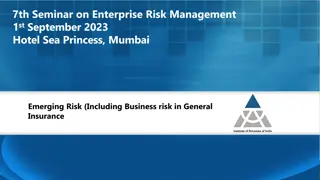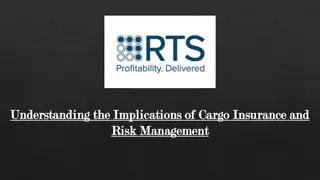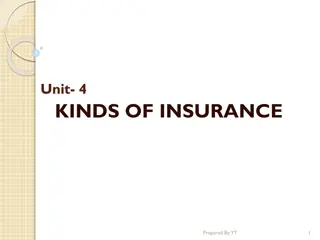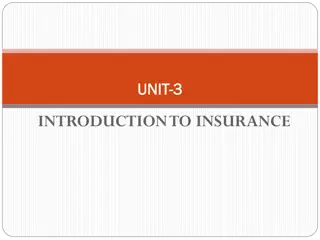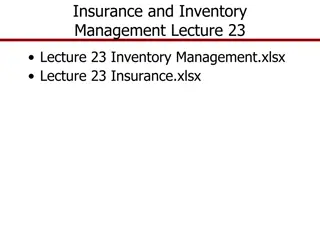Understanding Risk Management and Insurance in Economic Context
This content delves into the economic basis of insurance, risk management strategies, and the essential role insurance plays in sharing and transferring risks. It covers topics like historical development of insurance, classification of insurance contracts, and the benefits of risk management. By promoting risk sharing and transferring, insurance contributes to economic activity and helps businesses achieve their objectives while minimizing uncertainties.
Download Presentation

Please find below an Image/Link to download the presentation.
The content on the website is provided AS IS for your information and personal use only. It may not be sold, licensed, or shared on other websites without obtaining consent from the author. Download presentation by click this link. If you encounter any issues during the download, it is possible that the publisher has removed the file from their server.
E N D
Presentation Transcript
http://www.fff-legal.com/student-files/ tfenech@fff-legal.com www.fff-legal.com
The economic basis of insurance & the benefits to society of insurance systems Historical development The branches of insurance and classification of insurance contracts The contract defined or described Insurance and derivative instruments Insurance and wagers Insurance distinguished from suretyship and guarantees Insurance occupations tfenech@fff-legal.com www.fff-legal.com
Risk management is the identification, assessment, and prioritization of risks(defined inISO 31000 as the effect of uncertainty on objectives) followed by coordinated and economical application of resources to minimize, monitor, and control the probability and/or impact of unfortunate events or to maximize the realization of opportunities. Risk management s objective is to assure uncertainty does not deflect the endeavor from the business goals. Strategies to manage threats (uncertainties with negative consequences) typically include avoiding the threat, reducing the negative effect or probability of the threat, transferring all or part of the threat to another party, and even retaining some or all of the potential or actual consequences of a particular threat . Insurance as an economic device involves the transfer and sharing of risk It is only one aspect of a possible risk management plan and approach tfenech@fff-legal.com www.fff-legal.com
Insurance as an economic device involves the transfer and sharing of risk. It is one of the ways in which risk can be managed: risk may be avoided by not engaging in any form of hazardous enterprise at all; It may be retained, so that the person exposed to risk accepts responsibility for the potential financial loss (self-insurance), that groups of companies may undertake using a captive. It may be reduced, by limiting the magnitude of the loss or the likelihood of its occurrence, for example by installing a sprinkler system, or putting more secure locks on your doors and windows. It may be shared, for example by combining with others as members of a company. Insurance is a way of sharing risk by transferring it to another person who is more willing to bear it. Such a transfer may be contractual, but not all contracts which transfer risk are contracts of insurance. Hedging instruments and guarantees are examples of non-insurance contracts which transfer risk, though the dividing line between insurance and other forms of risk transfer, and in particular derivatives, is sometimes a very fine one. The economic benefits of insurance are that the transfer and sharing of risk encourages economic activity, as the full risk does not fall on the entrepreneur. tfenech@fff-legal.com www.fff-legal.com
Dorfman on insurance: a financial arrangement that redistributes the costs of unexpected losses An insurance system redistributes the cost of losses by collecting a premium payment from every participant in the system; In exchange for premium payment, the insurer promises to pay the insured s claims in the event of a covered loss; Generally, only a small percentage of insured persons suffer losses; It is therefore in the interest of the many that fewer losses occur to the individual members of the system tfenech@fff-legal.com www.fff-legal.com
House no.5 suffers 100,000 fire damage. With no insurance system in place, the burden of loss falls only on the unfortunate individual who owns home no. 5 tfenech@fff-legal.com www.fff-legal.com
1,000 1,000 1,000 1,000 1,000 1,000 Fire Insurance Pool With an insurance system in place, where the system particpants are contributing say 1,000 per annum for insurance from such possible losses, the cost of any actual loss is in effect redistributed to the pool. tfenech@fff-legal.com www.fff-legal.com
This does not predict an individuals losses, but can allow for the prediction of a group s loss experience in relation to chance events; the greater the number of observations of an event based on chance, the more likely the actual result will approximate the expected result; The die example; The importance of statistics, historical and other records; the greater the number of exposures in the pool, the more likely is the expected loss to be realised; tfenech@fff-legal.com www.fff-legal.com
the insurance company can thus predict, in monetary terms, the losses it is expected to experience in any particular period; If losses can be predicted accurately, then the calculation of the premiums to be applied follows naturally, and just as predictably; It is normally only a small percentage of insured persons who suffer losses. The cost of the loss is thus supported by all premium payers in the system; tfenech@fff-legal.com www.fff-legal.com
An English description of the economic basis of insurance, in terms of the transfer and sharing of risk, comes from the Web-site of HM Revenue & Customs: www.hmrc.gov.uk/manuals/gimanual/gim1090.htm Emmett J. Vaughan in Fundamentals of Risk and Insurance sums up the economic function and mathematical basis of insurance as follows: From the social point of view, insurance is an economic device for reducing and eliminating risk through the process of combining a sufficient number of homogeneous exposures into a group in order to make the losses predictable for the group as a whole. tfenech@fff-legal.com www.fff-legal.com
From an individual point of view, insurance is an economic device whereby the individual substitutes a small certain cost (the premium) for a large uncertain financial loss (the contingency insured against). NB: the system cannot be understood as a mere pooling mechanism (although certain forms of mutual insurance is still conducted in this manner through P & I Clubs). Regulatory systems all over the world impose solvency margins and liquidity ratios, etc., which would help ensure liquidity to cover unpredicted losses, etc. tfenech@fff-legal.com www.fff-legal.com
Stability in families:prevents material hardships that may otherwise result; Entrepreneurship:entrepreneurship implies risk- taking. Insurance facilitates risk taking, which itself is essential to progress; Credit facilitation: creditors more willing to lend money, if insurance is available Anti-monopoly device: without insurance, only the largest businesses could operate Lowers cost of capital: creditors/investors would otherwise charge more for the use of their money; also frees capital from non-productive reserves tfenech@fff-legal.com www.fff-legal.com
The insurance industry can be a more focused channel of investment in loss prevention and medical research; Insurers, and life insurance companies in particular, are quintessential financial intermediaries: they collect billions in people s savings and essentially reinvest these amounts in the economy; This has yet to be seen in Malta on a meaningful scale, largely because we still have old-model state social welfare systems for such things as old age pensions, etc. But this has to change tfenech@fff-legal.com www.fff-legal.com
Originating in connection with the sea, bottomry contracts were well known to merchants in Babylon of 4000 - 3000 BC : loans granted to merchants with the provision that if the shipment was lost at sea the loan did not have to be repaid. The interest on the loan covered the insurance risk. Also known in ancient Greece and Rome, and became highly developed in Mediaeval Italy; Lombards brought it to England in the 13th Century (settling in Lombard Street); Eventually the business moved to the Royal Exchange, which was the site of "Lloyd's" until 1928 tfenech@fff-legal.com www.fff-legal.com
groups of merchants agree to share marine risks and perils. From the late 17th Century, this business was increasingly transacted at a coffee house in the City of London owned by a man called Lloyd. Bird: "There developed the practice that the merchant wishing insurance would pass round to the people willing to provide it, who were gathered there, a slip of paper on which he had written the details of the ship, voyage and cargo etc. The slip was initialed by those willing to accept a proportion of the risk. When the total amount of insurance required was underwritten, the contract was complete. This is more or less the system at Lloyd s still today (underwriters accepting unlimited personal liability! tfenech@fff-legal.com www.fff-legal.com
Vivanteexplains that self-preservation instincts certainly induced medieval insurers to meet up in a central place, a coffee house or a stock exchange, simply to exchange information and the latest news concerning perils at sea, the probity of ship captains as well as the seaworthiness of particular ships. Maps, port hand-books, etc were normally kept there, and where necessary, they grouped up to discover fraud and denounce offenders, or recover lost ships. Certain individuals among them, Vivante continues, would naturally gain a reputation for expertise and wisdom in the choice, and handling, of risks, to the extent that, often entire groups would only underwrite a policy if such a person, or name , led it. tfenech@fff-legal.com www.fff-legal.com
The risk of losing ships and cargo at sea seems to have instigated the practice, and dominated insurance for a long time; When it spread to London, there were no separate insurers, just groups of merchants who would agree to share all of their risks among themselves; It was not until the appointment of Lord Mansfield as Lord chief Justice that the common law took a central interest in insurance contracts The principles developed for marine insurance have mostly been applied to other insurances; tfenech@fff-legal.com www.fff-legal.com
The influence of Lloyds on insurancelaw has been significant: the standard Lloyds marine policy was adopted as the standard form in the Marine Insurance Act 1906 The law governing non-marine insurance contracts is still largely based on case law, but there have been statutory inroads; Most importantly, the situation in the UK has developed as a result of the Consumer Insurance (Discolosure and Representations) Act 2012 and the Insurance Act 2015 tfenech@fff-legal.com www.fff-legal.com
Vivante: Insurance of maritime perils quickly become vital to maritime trade, but when increased trade spurred by the discovery of the new world also increased the incidence of insurer bankruptcy, the insurance market started becoming more collective and corporative in nature: "A Parigi (1686), a Londra (1726), a Copenhagen (1726), a Genova (1741), a Napoli (1751) si istituirono successivamente con regie patenti compagnie privilegiate per impedire, come lo attestano i decreti della loro costituzione, che gli assicuratori traessero nella propria rovina tutto il commercio marittimo e ne arrestassero gli ardimenti" tfenech@fff-legal.com www.fff-legal.com
The insurance market thus became progressively less dependant on chance, a more systematic and prudent industry, with the insurers seeking to have a wide enough premium base to ensure enough liquidity, asset or capital base to compensate for insured losses. Regulatory action followed, further underscoring the regulatory element,ultimately in the interest of the system as a whole tfenech@fff-legal.com www.fff-legal.com
the Insurance Business Act of 1981 regulated the industry, rather than the contract of insurance; It provided for organising the infrastructure upon which the insurance market should develop, and sought to ensure that all entities actively involved in the provision of insurance cover remain financially stable, and are "fit and proper" to be so active; Was replaced in 1998 by the Insurance Business Act 1998 (Cap. 403, being Act XVII of 1998) as well as the Insurance Brokers and other Intermediaries Act 1998; The latter was later replaced by the Insurance Intermediaries Act 2006 tfenech@fff-legal.com www.fff-legal.com
Prof. Felice Cremona, writing in 1970, had this to say: Our Commercial Code.....still regulates only the contract of marine insurance... In dealing with the kinds of insurance not regulated expressis verbis by our Commercial Code, i.e. land, life and accident insurances, the general principles governing same according to foreign laws shall be outlined, one may add that, because of the fact that in Malta the great majority of such insurances are entered into with English companies of insurance, the principles of English law and practice, in so far as applicable, shall form the basis for the purposes of said inquiry. tfenech@fff-legal.com www.fff-legal.com
This view has probably been followed tacitly by the courts in Malta, as well as industry and most commentators. Insurance professionals are normally members of British Insurance Institutes, my starting point would be to follow in Profs. Cremona s footsteps. However, particularly since EU membership, and the increasing body of law coming out of Brussels, I believe that this is changing. Increasing numbers of Continental and non-British insurers are being licensed to transact business in Malta. The need for a law regulating insurance contracts will eventually become compelling. So watch this space! tfenech@fff-legal.com www.fff-legal.com
http://ec.europa.eu/info/business-economy-euro/doing Buying and selling insurance in the EU is governed by national contract laws. Insurance coverage is a service that is exclusively defined by legal terms and provisions. In contrast to the sale of goods like washing-machines or clothes, insurance coverage depends on a particular legal framework and can be applied differently in different national legal environments. As a result, if an insurer wishes to offer their products in other EU countries, they may have to design different products for each of their intended national markets to comply with different national insurance laws. This may be costly for insurance companies and makes it almost impossible to offer the same insurance contract in more than one EU country. Removing contract-related barriers to cross-border insurance services would enable insurance companies to take full advantage of the European Single Market. Tackling such bottlenecks in the Internal Market is part of the Commission's "Europe 2020" strategy for promoting sustainable economic growth throughout Europe. tfenech@fff-legal.com www.fff-legal.com
Private Government Non-life Life Social Security Fire Life Unemployment Marine Annuity Bonding Health Casualty tfenech@fff-legal.com www.fff-legal.com
Fire insurance generally (but not always, as with cars) covers stationary property. Damage caused by such perils as windstorm, riot, and vandalism can be added to the basic fire coverage. Businesses, particularly in the US, often purchase business income (interruption) coverage, which provides payment for indirect losses associated with damage done by fires and other covered perils. Marine insurance generally covers ships, and risks associated with carriage by sea. tfenech@fff-legal.com www.fff-legal.com
Casualty insurance describes several different fields of insurance including automobile insurance, liability insurance, crime insurance, workers compensation, and accident and health insurance. Bonding is a special type of protection where the surety guarantees the performance (surety bond) or the honesty (fidelity bond) of a second party to a third party. tfenech@fff-legal.com www.fff-legal.com
If the covered peril is death, the contract is called life insurance. If the peril (peril must be understood as referring to the cause of the loss) is survival, the contract is called an annuity. The annuity guarantees that the insured will not have to survive without money. If the covered peril is sickness or disability, the coverage is called medical expense insurance or disability insurance tfenech@fff-legal.com www.fff-legal.com
myriad other perilscovered, and there are new areas coming out regularly; Examples: Weather-related insurance: payments can be made for crop-hail damage, rained-out concerts, or too much or too little snow. Change-of-law insurance: Payments are made, for example, if new regulations increase construction costs after contracts are signed tfenech@fff-legal.com www.fff-legal.com
The Maltese Insurance Business Act defines the business of insurance by reference to Schedules 2 and 3 of the Act which draw a distinction between two broad bands of insurance contracts: the first being grouped under the Title Long Term Business , which broadly groups the more long term savings/pension-oriented classes of business, and the second being broadly termed General Business . tfenech@fff-legal.com www.fff-legal.com
the nature of the event insured against; e.g. in Marine Insurance, the event insured against is a marine peril; whereas in fire insurance it is the happening of a fire, etc. the nature of the interest affected or in accordance with the manner in which the assured is prejudiced by the happening of the event insured against. E.g. a personal insurance (sickness, personal accident or death) where the assured himself is directly affected, or a form of property insurance, where it is property that is directly affected (marine, burglary, fire, etc), or a liability insurance, where the event imposes a liability towards others (e.g. public liability insurances or employers liability insurances). the nature of the insurance; or principally whether or not it is a contract of indemnity tfenech@fff-legal.com www.fff-legal.com
first or third party insurance, whereby under first party insurance one would be covering one's own direct losses, and under third party insurance one would be covering one's liability to third parties; simply distinguishing life and other insurances, simply because life is a certain event, whereas all other insurable perils are uncertain; tfenech@fff-legal.com www.fff-legal.com
definition is a matter of great importance; The courts have dealt with the issue for decades; If a transaction is labeled insurance , it is subject to regulations and tax laws peculiar to this transaction; Product guarantees or warranties . Are these a form of insurance? The availability of service contracts that guarantee replacement of parts on new appliances or automobiles, has raised the question whether or not they are in the nature of insurance, and therefore whether the provider has to be regulated as an insurer, whether there are the same duties of utmost good faith, etc. tfenech@fff-legal.com www.fff-legal.com
".... an agreement in which one party agrees, for a consideration, to pay to or for the account of another party or to beneficiaries, a sum of money or other consideration, whether by way of indemnity against loss, damage or liability or otherwise, on the happening of a specified event with respect to which there is an element of uncertainty as to when or whether it will take place." tfenech@fff-legal.com www.fff-legal.com
".... an agreement in which one party agrees, for a consideration, to pay to or for the account of another party or to beneficiaries, a sum of money or other consideration, whether by way of indemnity against loss, damage or liability or otherwise, on the happening of a specified event with respect to which there is an element of uncertainty as to when or whether it will take place." tfenech@fff-legal.com www.fff-legal.com
This is not really meant, and should not be taken to be a definition as such, but rather a succinct all encompassing description. It has often been said, particularly in the UK that attempts at legal definitions of an insurance contract are apt to fail. Normally, English courts have resorted to the old maxim that you know an elephant when you see one, although you cannot really define one. tfenech@fff-legal.com www.fff-legal.com
No statutory definition of insurance or insurance contracts until December 2001, and the confusing attempt made under the Financial Services and Markets Act of 2000 is best ignored. a Commercial Court decision of 1973 has traditionally been the main point of reference, in terms of descriptions of the contract. This is Joseph Micallef noe vs Roman Vella, decided on the 6/04/1973 tfenech@fff-legal.com www.fff-legal.com
"Il-kuntratt ta' assigurazzjoni huwa, bla dubju ta' xejn, kuntratt aleatorju, definit (mill-artiklu 1005 tal- Kodici Civili) bhala l-kuntratt li fih "l-qliegh jew it- telf, ghaz-zewg partijiet jew ghal wahda minnhom, ikun jiddependi minn grajja mhix zgura", u ghalhekk jekk ma jkunx hemm l'alea (ir-riskju tat-telf u l- isperanza tal-qliegh) jonqos l-element principali ghall-kuntratt ta' assigurazzjoni (Judge Riccardo Farrugia) tfenech@fff-legal.com www.fff-legal.com
Court of Appeal 1188/2000/1 Salvatore Sammut vs Middle Sea Insurance p.l.c (14th May 2004) Court of Appeal 2993/2002/1 Carmen Camilleri vs Middlesea Insurance plc (4th May 2005) tfenech@fff-legal.com www.fff-legal.com
"The contract of insurance is basically governed by the rules which form part of the general law of contract, but equally there is no doubt that over the years it has attracted many principles of its own to such an extent that it is perfectly proper to speak of a law of insurance. tfenech@fff-legal.com www.fff-legal.com
After making numerous caveats, Birds suggests the following: "...a contract of insurance is any contract having as its principal object one party (the insurer) assuming the risk of an uncertain event, which is not within its control, happening at a future time, in which event the other party (the insured) has an interest, and under which contract the insurer is bound to pay money or provide its equivalent if the uncertain event occurs. It would follow that anyone who regularly enters into such contracts .is carrying on insurance business tfenech@fff-legal.com www.fff-legal.com
Transfer of risk of a future event; not within the transferee s control; Where insured has an interest; And where transferee must pay to transferor money or equivalent if event occurs Birds own analysis focuses on: 1. Legal entitlement; 2. uncertainty; 3. Insurable interest; 4. Control; 5. Provision of money s worth tfenech@fff-legal.com www.fff-legal.com
There must be a legal entitlement to compensation. In other words the insurer must be bound by A CLEAR LEGAL DUTY to compensate the insured, and not have a mere discretionary role. He cites Medical Defence Union v. Department of Trade where plaintiff was a company whose members were practicing doctors and dentists. Its business consisted primarily of conducting legal proceedings on behalf of members and... tfenech@fff-legal.com www.fff-legal.com
...indemnifying them against claims made against them in respect of damages and costs. However under its constitution, its members had no right to such benefits, merely the right to request that they be given assistance or an indemnity. It was held that the company was not carrying on insurance business, because an insurance contract must provide for the right of the insured to money or money s worth on the happening of an uncertain event. The right to request assistance was not such a right. tfenech@fff-legal.com www.fff-legal.com
The uncertainty in most classes of insurance is whether or not a certain event insured against will occur. In the case of life insurance, the uncertainty is as to when the event insured against will occur. insurance squarely falls under the classification of contracts of an aleatory nature. In this context, section 964 of the Civil Code states: "When the advantage or loss, whether to both parties or one of them, depends on an uncertain event, the contract is aleatory." tfenech@fff-legal.com www.fff-legal.com






